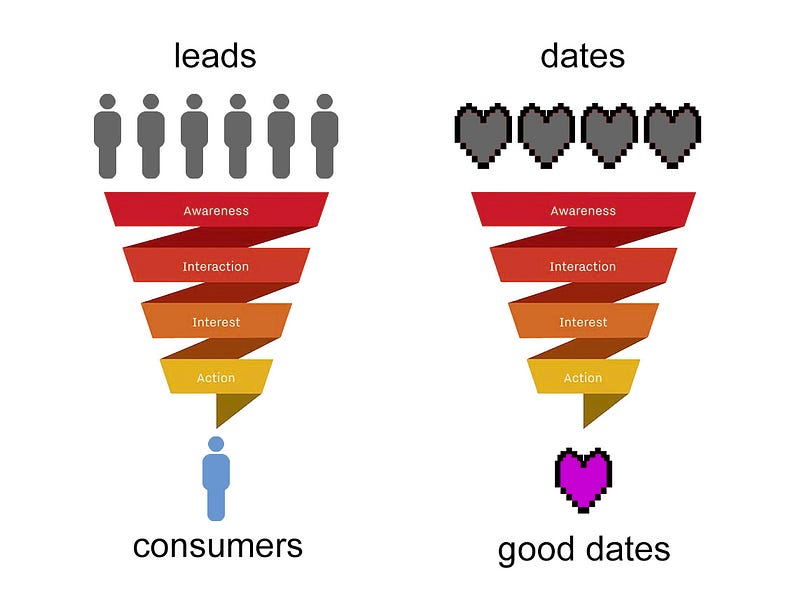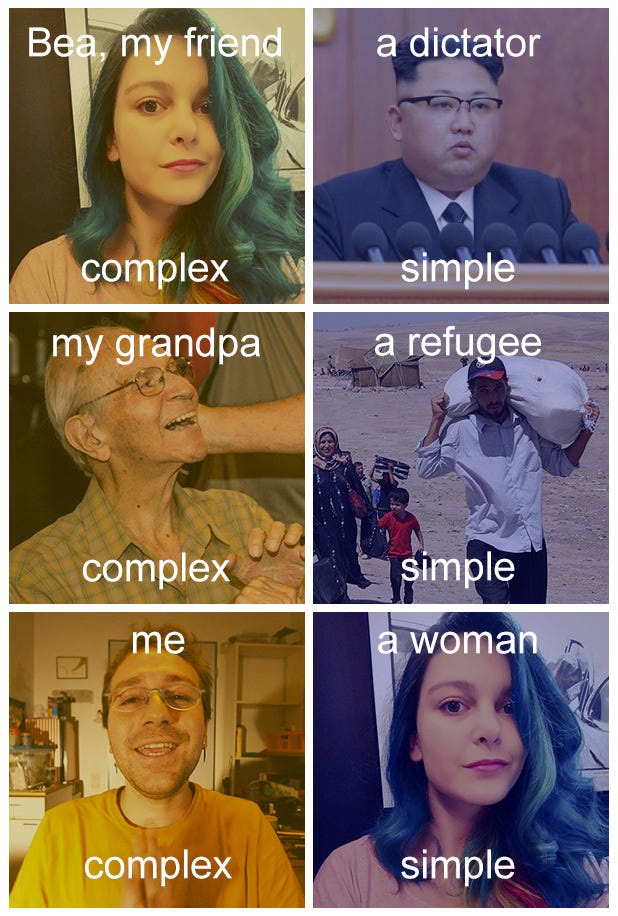“So tools like sales funnel, and lean prototyping could be useful when you think about dating. You know, you need to have more dates if you want to have good dates, same with leads and final consumers. It’s a matter of logic” — said a friend of mine, staring me with his gold coin-shaped eyes.
I got the idea — and it made sense. Still, I was frowning, there was something wrong. Hearing this felt like liking sandpaper.
My friend guaranteed he was not talking about those dehumanizing Pick-Up-Artist techniques and honestly I never thought he was. He’s not that kind of person, but he’s definitely a businessman (strong handshake all that jazz). He told me it was just adding a tool to the toolbelt. The tool itself doesn’t come with morals, homie! You can use a hammer to kill your neighbor, but you have to be fucked up in the first place. It’s not the hammer’s doing.
True. Nonetheless, I cringed. The more I agreed, the more it felt like chewing glass.
So I marinated it for a couple of days.

Rationalization — the empire of the useful
Of course, I could see how one could benefit. Especially shy people — having a guideline can really help you set things in motion and actually go there get some goddamn dates. This could even help facing the cold cold catacomb of rejection — if your metaphor is sales, you know many people will not “buy” you and that is perfectly ok. It’s part of the machine.
The power of “I have enough planning to move my ass” was a sweet song.
I also remembered Amy Webb’s fantastic TED Talk in which she tells the tale of how she used applied statistics to hack OkCupid’s website. This woman is a powerhouse! Magnificent!
She did all sorts of weird tinkering and testing, including a rating system for prospect dates, creating fake profiles and test which words worked. All of this is also cringy at first, but she did find love! She’s happily married to a guy she met over there (he had a really high rating, good stuff).
So why not? Because brains are complicated.

It’s impossible to think outside the box
Let’s talk about brains.
Imagine paying attention to every single thing you senses are capturing right now: every colour, every shape, every sound. Now imagine doing this while also recollecting all of your memories at once. First kiss, second math test in 7th grade, last Friday’s breakfast, everything. That’s more noise than a Pantera concert.
Point is: one of the major functions of our brains is filtering. The brain filtering process is putting things in boxes.
When you enter your room — BAM! Your brain automatically dilutes everything into a single “room” chunk, so you don’t have to think about every little object individually. Then, when you decide to grab your book from the shelf, your brain focuses on the individual “book” chunks in front of you, while giving less attention to everything else.
Brilliant process, right? Not having this system would probably feel like a neverending bad acid trip.
But it’s also the same cognitive process that made possible for a human to associate “black person” and “slave” without a second thought. Clearly we must be very careful about our cognition — specially when it comes to people.
We’re like cats, we are naturally driven to boxes. But unlike cats we have a saying on which boxes we use.

The lens of truth
It is easy to write and to read that every single human is as complex and as multifaceted as you are. Understanding this fully, though, it’s very complicated — many would say impossible.
I don’t think it’s a matter of empathy — do you think that a lot of cute cookie-baking grandmas hate minorities because they don’t care about people? The problem is somewhere else.
So where? Imagination (lack of, actually).
Our brains are far more wired to understanding and processing information than creating new information. So when you give yourself the challenge to imagine somebody else as complexly as yourself, it is an impossible imaginary feat.
We don’t have the means to simulate somebody else in our brain. We lack the processing power. Still, the exercise counts — it’s the exercise that end up revealing our internal boxes.

Simplifying and Complexifying
The brain is designed to do many things and it pretty much works as a muscle — you exercise certain parts and they can do more and more. The filtering part is constant and powerful. The creative part is also a normal process, but far more on-demand.
So when your brain grabs a piece of information and make it simpler, easy peasy! It’s something it does all the damn time. The other way around, though, when you grab something simple and use imagination to attribute complexity to it, it is a far less trained muscle.
Now we can go back to dating.

You don’t want to date a number
Here’s my cringe treasure cove: once you turn a prospect date into a number in a “dating funnel”, it is possible to reverse the process — but it requires a lot of energy.
Some people — like Amy Webb, the human algorithm — can do it. But we have no idea how much energy she had to spend to turn a really good rating into a husband. We have no idea if she still struggles to not compare him to “other ratings” the meets around. Numerifying can have permanent side effects.
So while it’s true that hammers don’t come with social stigma, I think lenses kinda do. Give two different people widely different lenses — let’s say a macro lens and a wide angle — and tell ’em to take a picture in the mirror. In the first, we’ll only see a nose. In the second, we’ll see a tiny person and the whole saloon around.
And just for the record, if you’re fucked up enough, you can kill your neighbor with basically anything. Even a solid pair of lenses.

This is a work in progress
Instead of just bashing, growling and shrieking to the dark night sky, I tried to view this reflection exercise as an opportunity for learning. Even if I really like shrieking.
Now thinking about it more clearly, marketing has tools like the empathy map that actually encourages people to imagine others complexly. I’m sure there are many possible paths to follow from here.
But I could use some help. Not really with dating (I’m blissfully out of the Tinder Samsara) — but with complexity kaleidoscopes.
Do you know any tool (marketing, music, engineering, holistic medicine, VR programming: any field really) that actively encourages the user to have a more nuanced view on other people? If so, I’d love to give it a look.
If you read this text ‘till the very end, please leave a comment with the name of your favorite fruit + a sauce that would make it absolutely gross. Like barbecue passion fruit *shivers*. And of course — please, leave your tool recommendations as well.

To read more of my articles go to medium.com/@joriam












